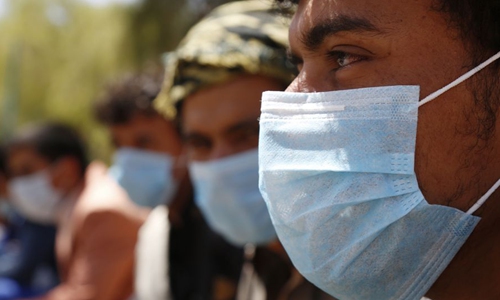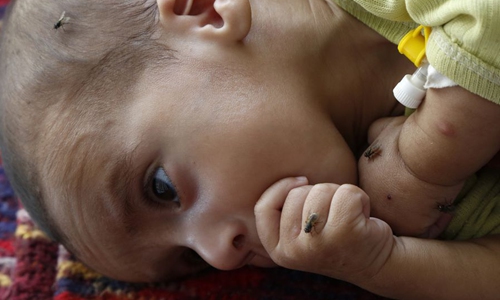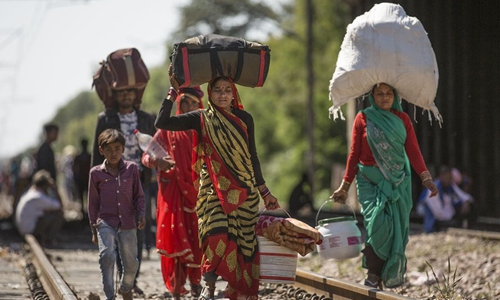HOME >> PHOTOS
UN food agency chief urges immediate efforts to prevent COVID-19 from triggering food crisis
Source:Xinhua Published: 2020/4/1 16:21:34

Orphans wear masks they received as an aid against the coronavirus in an orphan center in Sanaa, Yemen, March 23, 2020. (Photo by Mohammed Mohammed/Xinhua)
Director-General of the Food and Agriculture Organization (FAO) of the United Nations, Qu Dongyu, has urged immediate international efforts to prevent the COVID-19 pandemic from triggering a food crisis worldwide.
He made the appeal in a signed article published online recently, saying the international community should act immediately to minimize the pandemic's impact on food supply chains worldwide so that the public health crisis due to COVID-19 will not lead to a halt to food supplies nor excessive prices.
In fighting the novel coronavirus, "massive efforts to turn the tide carry a heavy economic cost," and "To reduce the risk of an even greater toll -- shortage of food for millions, even in affluent countries -- the world must take immediate actions to minimize disruptions to food supply chains," Qu said in the article titled "Don't let COVID-19 become a hunger game."
"A globally coordinated and coherent response is needed to prevent this public health crisis from triggering a food crisis in which people cannot find or afford food," noted Qu.

A malnourished child lies in a bed and receives treatment at Al-Jumhori hospital in Saada province, March 19, 2020. (Photo by Mohammed Mohammed/Xinhua)
The FAO chief ruled out a food shortage in terms of volume, but warned against a plight of distribution.
"While there's no need for panic - there is enough supply of food in the world to feed everyone - we must face the challenge: an enormous risk that food may not be made available where it is needed," he noted.
The closures and lockdowns in efforts to curb the spread of COVID-19, he explained, have "created logistical bottlenecks that ricochet across the long value chains of the modern global economy."
In addition, restrictions of movement and basic aversion behavior by workers "may impede farmers from farming and food processors (who handle most agricultural products) from processing."
Meanwhile, "Shortage of fertilizers, veterinary medicines and other input could also affect agricultural production," he said.
The FAO chief also noticed a shrinking market demand in the wake of closures of restaurants and less frequent grocery shopping, which he said affect producers and suppliers, especially smallholder farmers, "with long-term consequences for the world's increasingly urbanized population, be they in Manhattan or Manila."
He also warned: "Uncertainty about food availability can induce policymakers to implement trade restrictive measures in order to safeguard national food security," which, however, "can only exacerbate the situation," as was shown in the 2007-2008 global food price crisis.
Export restrictions by countries could seriously disrupt the world food market, "resulting in price spikes and increased price volatility," he noted, adding that such measures taken in 2007-2008 have proved "extremely damaging," with the low-income food-deficit countries being the hardest hit alongside humanitarian organizations that procure supplies for the needy and vulnerable.
Noting that the mistakes should not be repeated, Qu called on policy makers to take care to "avoid accidentally tightening food-supply conditions."

Migrant labourers walk to their villages during the lockdown in New Delhi, India, March 29, 2020. (Xinhua/Javed Dar)
Despite the fact that every country faces its own challenges, the collaboration between governments and the full gamut of sectors and stakeholders is "paramount," he said, stressing that a global problem requires a global response.
Qu stressed the need and urged efforts to ensure that food markets function properly, including making information on prices, production, consumption and stocks of food available to all in real time, in order to reduce uncertainty, enabling producers, consumers, traders and processors to make informed decisions as well as the containment of unwarranted panic behaviour in global food markets.
"We already have 113 million people experiencing acute hunger; in sub-Saharan Africa, a quarter of the population is undernourished," he said. "Any disruptions to food supply chains will intensify both human suffering and the challenge of reducing hunger around the world."
"Global markets are critical for smoothening supply and demand shocks across countries and regions, and we need to work together to ensure that disruptions of food supply chains are minimized as much as possible," Qu said.
COVID-19 forcefully reminds the world that "solidarity is not charity, but common sense," he added.
Posted in: WORLD